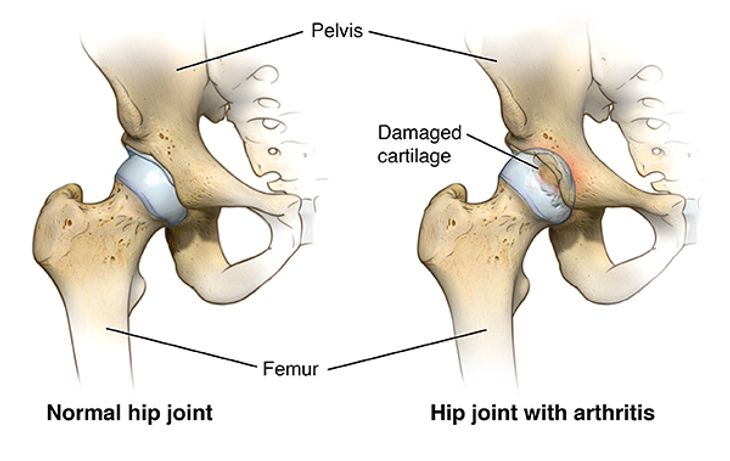Hip joint replacement in India

Injuries around the thighs, groin, inside or outside of the hip joint itself, or the buttocks, often lead to various degrees of pain in the hips. This could range from something minor to major cases that could require surgical procedures to fix. When the damage to the hips is beyond repair and other treatments don’t work, the doctor may ask you to consider a complete hip joint replacement.
What is Hip Replacement?
Hip replacement is a surgical procedure that involves replacing the damaged hip joint with a prosthetic implant. The Hip prosthesis restores the functionality of the hip joint. Depending upon the damage, caused by factors like arthritis or hip fractures, the procedure may be a half replacement or a total replacement.
Are there any complications of Hip Replacement Surgery?
To begin with, hip replacement is usually considered when physical therapy and medications dealing with pain have failed to provide relief to the patient. Akin to all other forms of joint replacements, the procedure also involves risks like dislocation, chronic pain, infection and a difference in the length of limbs. Please consult a doctor to understand the complications involved with this process.
It is upto the patient’s orthopaedic surgeon’s discretion to finalize the type of implant. For example, a patient with underlying conditions like the suppressed immune system, or kidney problems, or allergy to metals would disqualify for a Metal on the Metal implant.
When should you consider a hip replacement?
Patients may require a total hip replacement only in cases of total joint failure, where both the acetabulum and the femoral head need to be replaced. This is often caused by osteoarthritis. In less severe cases, a ‘half’ hip replacement may be the preferred treatment. Hip Replacement may also be suggested when the patient suffers from benign or malignant bone tumors, ankylosing spondylitis or juvenile rheumatoid arthritis.
What are the different types of Hip Replacement Surgeries?
Depending on the placing and the cuts, there are a number of approaches to a hip replacement. The Posterior or Anterior-lateral approaches are the ones favoured by surgeons. The Posterior approach involves making incisions at the back, which provides convenient access to the acetabulum. The process also decreases the risk of damaging the hip abductors, which is a cause of abductor dysfunction.
A newer form of Hip replacement is the minimally invasive approach which derives its name from the smaller incisions made to avoid or minimise the damaging of soft tissues near the operating area. However, a minimally invasive surgery impairs the surgeon's visions which may decrease the visibility, and hence the accuracy of the surgeon.
What are the prosthetics joint implants made up of?
A modern hip prosthesis is usually made up of two major parts, the ball component, and the socket component. In standard Metal on Metal (MoM) implants, the ball component is usually made of a metal or ceramic material, with a highly polished surface. The socket part needs to be durable and is made from plastic, ceramic, metal or sometimes polyethene.
What are the procedures post surgery?
Patients who have gone through a hip replacement surgery are confined to only limited movement. The hip is kept in place by the use of pillows or devices when the patient is in bed. Intravenous tubes may be used to give the patient fluids lost during the surgery. Another tube may be placed near the incision to drain any excess fluid and medication might be prescribed to relieve the patient of pain or discomfort. A catheter may be used to drain urine until the patient is able to use the bathroom again.
What is the recovery time post a hip replacement surgery?
Recovering patient will most likely be able to leave the hospital after a period of 10-15 days post surgery. Short term recovery time is usually 4 to 6 weeks after the surgery. It is around this time that the patient will no longer require walking aids and may begin to walk a little more than before without experiencing pain. Eventually as the operated area heals and as the patient gets more accustomed (physically and mentally) to the new prosthesis, he/she may expect their lifestyle to eventually be close to what it was before, albeit without the pain and discomfort. Complete recovery may take up to 6 months.
How do I prepare myself for surgery?
If the patient does choose to go ahead with the surgery, various hip and breathing exercises may be suggested to prepare the body for the approaching surgery. Restrictions may also be placed on your diet. For instance, the patient is usually allowed to have water upto two hours before their surgery and is asked to avoid heavy food or food that is high in fat.
After surgery, it is a good idea to have someone to help you out at home for a couple of weeks and to take you to and from the hospital. At home, try to place all your frequently used things like the television remote, water, and your medicines close by. Also, try to keep everything at arm's length so you can avoid having to reach up or bend often. It is also a good idea to know what exercises will help you recover faster.
What is the cost of hip replacement surgery?
A usual hip replacement estimate including the surgery, the anesthesia and the hospital stay, costs around $22,000 to $23,000. The amount of finance required for this procedure and follow up may not be affordable for everyone, especially if you’re not covered by a medical insurance. You can, however, consider treatment in other regions or countries, like India, where you can get quality treatment at affordable prices.
What is the cost for Hip Replacement Surgery in India?
Being a complicated procedure, joint replacements are known to be expensive. Depending on where you live in say, the USA, a hip replacement surgery would set you back by roughly $20,000(California & Pennsylvania) – $60,000(Colorado & New York). In a study by the orthopaedic institute at Mercy Hospital, Miami, it is observed that in a total hip replacement, the cost usually breaks down to 5% hospital fees, 10% post-discharge costs, 26% device costs, and 59% surgeon fees.
The Hip Replacement Surgery Cost in India is a lot lesser than, and in some cases, a fraction of the costs incurred abroad in western countries. An average estimate of a hip replacement surgery cost in India would amount starts from USD 5200. Provided you look for a good, reputed hospital with an excellent team of doctors, you can receive quality treatment as the hip replacement surgery success rate in India is pretty good, given that the Indian Government has regulated the cost on artificial joints, and the country is home to some of the best orthopaedic surgeons.





